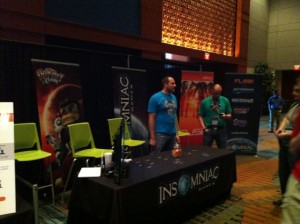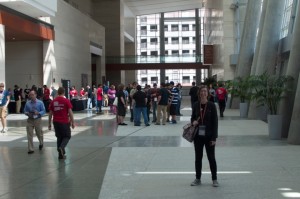
The East Coast Game Conference, created by the Triangle Game Initiative, is a conference for professionals, academics, and those who want to learn how to break into the video game industry. Now in its fifth year, it has grown by 20% every year since its inception. For two days this week, April 24 and 25, the Convention Center in Raleigh, North Carolina was taken over by over 1,300 members – and aspiring members – of the video game industry. There were workshops, keynotes, and a robust expo that had a plethora of job opportunities for professionals and students alike.
For anyone looking to break into the game industry, there were several tracks of workshops they could choose from – Design, Art, Mobile, Writing, Serious Games, Programming, Education, and Career. They also had a Career Lounge available to help those who wanted to break into the game industry. “Tabletop Design Principles” by Jason Morningstar of Bully Pulpit Games was a great discussion about the ingredients that go into RPG creation. Morningstar was open and honest, detailing not just his experience making games but also what goes into playing them. Other Design workshops included “100 Million Friends You Can Never Know” and “How to Become A Unicorn: The Elusive Designer Programmer.”
The Career workshops focused on integral topics; IGDA Executive Director Kate Edwards’ talk, “A Call To Action,” asked several crucial questions to the audience: “When’s the last time you contacted your lawmakers to voice your opinion as a game developer?” and “When’s the last time you raised concern about a character’s design, or the use of blatant stereotypes?” Edwards also pointed out that “Outside the game industry, crunch mode is usually called ‘poor project management,'” a fact many people don’t consider.
 The Career Lounge had an option for portfolio critiques, and had some helpful roundtables, like “Working Your Way Into the Industry – from QA to Art.” This went hand in hand with the expo floor itself, which was a valuable resource for those looking for jobs or educational opportunities. Several booths had hiring notices for various positions, and some college programs were also drawing some attention. The Child’s Play charity was on hand with a raffle, and they were also running several PC game tournaments on the floor as well.
The Career Lounge had an option for portfolio critiques, and had some helpful roundtables, like “Working Your Way Into the Industry – from QA to Art.” This went hand in hand with the expo floor itself, which was a valuable resource for those looking for jobs or educational opportunities. Several booths had hiring notices for various positions, and some college programs were also drawing some attention. The Child’s Play charity was on hand with a raffle, and they were also running several PC game tournaments on the floor as well.
The keynotes by Cliff Bleszinski and Jason VandenBerghe were innovative and revealing as well. Bleszinksi, who used to work for Epic Games and is now unemployed, as he awkwardly pointed out in the first slide, discussed the current generation of gamers and how game development should evolve to fit their personalities and attitudes. He also pushed for Raleigh to become the new hub for video game and technology development here on the East Coast, pointing out its strengths and what drew him there in the first place.
VandenBerghe, Creative Director at Ubisoft, had a much different message to convey. His talk, “Acting Like Players – Applying the 5 Domains of Play,” focused on the need for designers to “develop accurate empathy” in order to make better games. He went over various personality tests and encouraged everyone in the room to take the personality tests, find where they fell on his charts, and then discover the games that were the opposite of those we were predisposed to… and play those in the shoes of other players. Are you usually a first-person shooter who scorns RPGs? Go play Dark Souls for an hour. Don’t understand why people enjoy Animal Crossing? Put yourself in their shoes and learn what it is to be them for an hour.
 VandenBerghe spent two and a half years playing games he never would have played – going through an entire library of games and playing them in alphabetical order. “I have played every Barbie game… Actually a few good ones,” he joked during his talk. His point was that he wanted everyone to become better people so they could become better game designers. I was moved by his message, and I am going to check out some games I normally wouldn’t and see if I can play games from another gamer’s couch.
VandenBerghe spent two and a half years playing games he never would have played – going through an entire library of games and playing them in alphabetical order. “I have played every Barbie game… Actually a few good ones,” he joked during his talk. His point was that he wanted everyone to become better people so they could become better game designers. I was moved by his message, and I am going to check out some games I normally wouldn’t and see if I can play games from another gamer’s couch.
The East Coast Game Conference was a unique experience for me, as I have never been to a conference specifically for developers and designers. I enjoyed the Writing track, where I learned much about the craft and how to apply it across different media. I was pleasantly surprised by both keynotes, which were much more heartwarming than I expected. It was all around a feel-good experience, and I highly recommend next year’s conference to anyone who can’t afford GDC and can appreciate a more intimate experience.
All pictures courtesy of Zenas Bellace.







